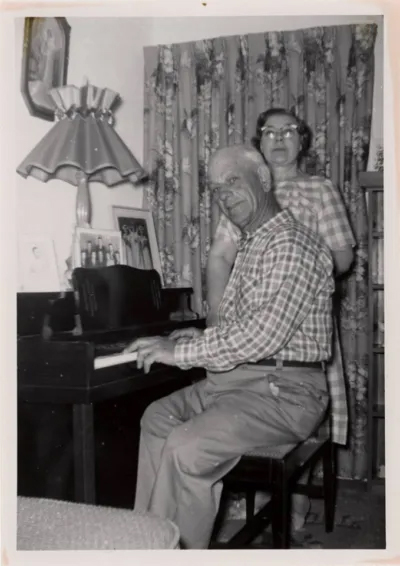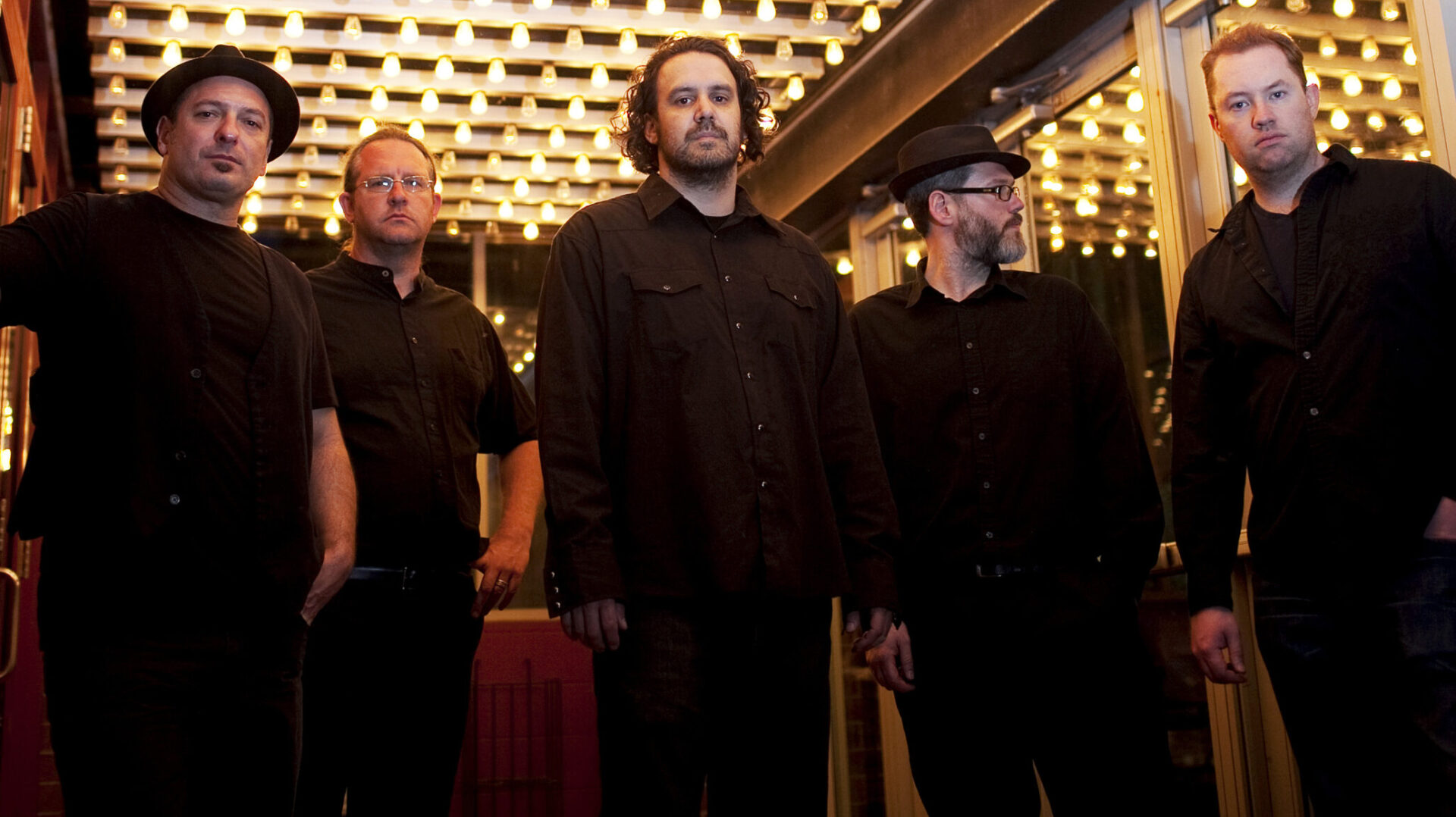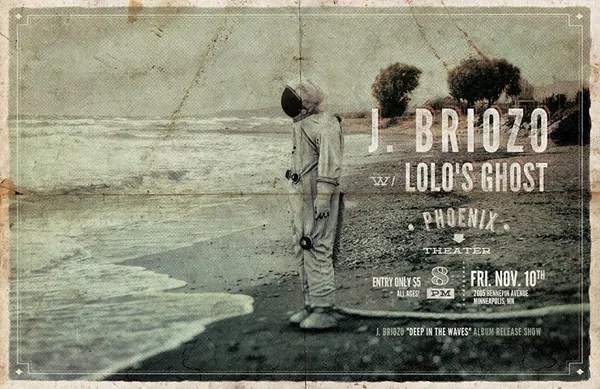Interview – Jeff Crandall – J. Briozo Deep in the Waves
November 7, 2017 by Rebecca Marx
Originally posted at: http://riftmagazine.com/2017/11/07/interview-jeff-crandall-j-briozo-deep-in-the-waves/
Deep in the Waves by J. Briozo is a dark horse. For those familiar with Jeff Crandall as frontman of the local band Swallows, prepare to get immersed in something quite different, certainly for me not what I expected to hear from Crandall’s debut “solo” work.
I write “solo” purposefully as that is how Crandall refers to J. Briozo, and to acknowledge that the members of Swallows perform on the album. In fact, Crandall who is frontman of Swallows was working on their new album when J. Briozo started its evolution into a “solo” concept album in another studio just across town. Sitting down with Jeff Crandall at a local coffee shop I learned a lot about the emotion not only behind the songs of Deep in the Waves, but behind the musician himself.
Rift: What is J. Briozo?
JC: Briozo was my grandfather’s family name on my mom’s side. My grandfather’s name was John–also a “J” name. His family was from Terceira but he and his dad also lived in Brazil before immigrating to the US. I don’t know if they just worked on dairies in Brazil or if they owned them, but there are more Briozo’s in Brazil than anywhere that I could find, so I think that part of that side of the family is Brazilian Portuguese. At some point when my grandfather was still very young, he immigrated to Central California where a lot of people from the Azores were immigrating at that time. This was likely prior to 1920. He worked to save up enough money to go back to Terceira and marry my grandmother and then brought her back with him to California where they eventually bought land and built up a family-run dairy farm.
Also, a long time ago I’d read this article from National Geographic about the Azore Islands where my mother is from, and there was some kid called Josué–what a cool name. And I thought: “What if my mother had married a Portuguese guy–maybe I’d be Josué instead of Jeff? Why couldn’t I have been called that?” It was kind of funny–the Josué in the article, his father’s name was Almerindo, and my mother’s name was Almerinda so I was like: “sounds like my family,” and I just kept it in my head. I wondered what it would be like to be Josué Briozo and what kind of music would I have made?
Then these songs started coming out from that and I didn’t want to put them out under my name, so this is kind of the next best thing. The album feels a lot like the West Coast where I am from, and sort of like my mother’s side somehow. Swallows is more the masculine or the paternal/ rock side, whereas the maternal/ feminine side from the Azore Islands is more the singer songwriter side.

Pictured Jeff Crandall’s Grandfather John Briozo, with his wife Livia.
Rift: How does J. Briozo distinguish itself from your work with Swallows?
JC: J. Briozo is definitely a singer songwriter to start with as opposed to a full band, even though the project is backed by a full band. I wanted to have a way to have the singer songwriter aspect take center stage and that is partly why this happened. I can write songs too as opposed to the big band thing with the Swallows, that is inside Swallows too, but I feel like it gets a little diminished. Secondarily, it is more spontaneous for all of us, including the songwriting which just kind of happened. I like to have personal jam sessions where I’ll just sit and have ideas and then have second, third or fourth ideas and often those B, C and D ideas might end up being the gems…A song might come out of something that just struck me about what was happening in my life, or in the world around me at that time.
Rift: I definitely hear a lot more vulnerability and emotion not only in your vocals, but also in your lyrics with Deep in the Waves. Especially in the first track “Blind”–you begin the song nearly in a whisper which is something that I haven’t witnessed before in your previous work and frankly took me by surprise. Does having a pseudonym allow you to be more free artistically?
JC: I think so, even though I worked with a lot of the same people on J. Briozo that I do with Swallows. I think everyone was happier about it all, we just let everyone do, and be themselves. We got to be these different selves–maybe our deeper selves?
The kind of lighter voice thing, in the studio you’re freer to do that kind of a thing versus onstage where you tend to go more full throttle over the noise of the bar, or the crowd. On these songs I recognized I didn’t have to do that. I didn’t even know if we’d perform these songs. I was like “Well, I am going to really hold back vocally and see what that is like”. I was probably singing at 10 to 20% volume compared to what I do with Swallows. It was kind of funny at the end of the recording, sometimes you might hear a click on the vocals and it was: ”Do we have another take of the vocal that we could use?” Ultimately, it was almost always the first or second scratch take that we’d use. I didn’t come back and redo most of it. It was nearly off the cuff. I wanted to get the vibe. On the song “Santa Cruz” it just kind of starts to break apart at the end, and that just kind of happened. I don’t think I knew when the song really ended. I did four layers of guitar and vocals on garage band and they all ended at different times, and I just thought that it sounded cool. I wanted that. I always spoil that by cleaning the shit up. Don’t clean it up.
Rift: It seems authentic to me even though J. Briozo is a pseudonym. Like the flip side of Jeff Crandall, maybe your mother’s side stepping into the forefront?
JC: It is.
Rift: Your mother passed away recently, but this album was in the works prior to that happening?
JC: We had tracked most of it, and she passed away right before we were mixing it. That sucked. It was right around the time that Prince passed away. I flew out to California and spent a lot of time in the hospital with her. We didn’t know it was cancer until she was taken off of life support. It was really sudden, she had a mysterious breakdown, started slurring her words, fell down a few times and they took her to the Doctor. By the time I got there they had tried one round of chemo from which she suffered horrible side effects from, and it didn’t work, and the next day we were all signing papers. It was crazy.
Rift: That had to have affected you so much, and concurrently you were working on this album that in part comes from a really deep emotional place that reflects so much of your heritage on your mother’s side. Did that change the album?
JC: I still hadn’t decided just how to put the album out, and now it was definitely going to be put out as J. Briozo.
Rift: Was your mother able to hear any of the songs from Deep in the Waves?
JC: After saying my goodbyes and crying for a while, I told her about the album and played the song “Deep in the Waves” for her on my iPhone. I thought that would be it, but she’s a tough old Portuguese woman who grew up on a dairy farm so she wound up surviving for several more days without food or water. During that time, I wound up playing her a lot of music that I knew she would like on that phone –my first cell phone by the way that I bought for that trip–yes, 2016 is the year I bought my first cell phone. The music lightened everyone’s mood and it gave me and my dad things to talk about that recalled a lot of stories and happier times.
Finally, on the day before she passed, I had some alone time again and I wound up singing her “Deep in the Waves” in the room. I didn’t have a guitar so I just sang to the recording on the phone, but for some reason it seemed important to me for her to hear me singing it in the room. I’m sure this was just for myself because she was pretty out of it by that time. It was all very emotional as I’m sure you can imagine. I don’t know why that song, either–it just seemed to be the right one.
Rift: That must have been difficult for you, and I have to think that your mother must have been very proud of you. Aside from your heritage being a catalyst, I noticed that Deep in the Waves also seems to find inspiration in actual places: “Santa Cruz”, “Catalonia”, and “Las Cruces” all being song titles.
JC: Yeah, this album for sure is very geographical. There is other stuff happening too. “Catalonia” was inspired by my stepson who was traveling through Europe. I just thought of J. Briozo doing that, having wanderlust. I like that song a lot actually.
Rift: I do too, not to mention that it is very timely with the people of Catalonia fighting for their independence from Spain…
JC: Okay, so I have to confess that I have sent copies of it to radio stations in Catalonia.
Rift: There you go–see if they bite! The album does have moments that I hear a world music influence including a seemingly Middle Eastern flair on “Firefly”. That song in particular is arranged beautifully, very emotionally.
JC: We spent a lot of time arranging the album, in the mixing too. A lot of layers. You mentioned something about an “immersive experience” and that is what I really wanted to offer with this album. I wanted it to be not only the songs, but a journey.
Rift: I get that. I think I compared the listening experience to Eddie Vedder’s Into The Wild for me. I set out to listen here and there when I could, but found myself sitting down with it and consciously listening to the whole thing–not just dropping in.
JC: If you drop in you might miss some of the magic, the geography of it. You are going place to place in the songs–there is Europe to the Midwest to New Mexico–where all things must end in Las Cruces. The end of a relationship.
Rift: Is that a real thing? The end of a relationship in Las Cruces?
JC: Placing it there is not real, but the relationship ending is real. A lot of the album is dead on from real life experiences, but some of it is me exploring as a songwriter. What it would be like to have ended it in a Motel room in Las Cruces? A dusty, dry place. You feel like you are at the edge of a precipice.
Rift: I caught the reference to Peaches Geldof (late daughter of Bob Geldof who in 2014 passed away of a heroin overdose) in “The Big Parade”.
JC: You’re the first person outside of the band who caught that.
Rift: I remember seeing it covered on the BBC news at the time. Her death struck a chord?
JC: I’ve been a fan of Bob Geldof all of my life, Live Aide and on. I even wrote a paper on Live Aide. Geldof’s been through so much, I mean how much can one guy take? So he has been through all this stuff and when I heard about Peaches I decided to write a song about it. I thought that the whole song would be about that, but it became more about being succumbed by the rush of everything–the news, life and the speed at which we get information so quickly that we have to struggle to get back to what we were even thinking about. Always the next thing. It feels like life is more like that now, so that is where the concept for the song came in.
Rift: You said that you didn’t really know if you’d perform this J. Briozo album live–but, I saw you perform it at the Aster Cafe, what are your plans for Deep in the Waves?
JC: I think we were all a little bit taken by surprise by it, that it went as far as it did, and became as musical as it did. When I started it I didn’t want to have to make another website or social media presence you know? Market another whole thing. I hate to keep splitting it all up, but these things are separate–J. Briozo is not Swallows. The marketing standpoint is hard for people to understand–what we do and why there might be time lapses. I did approach the band to ask them if they’d consider putting it out as a Swallows record, and after listening to the demo they were like “Probably not”. You know, it’s too different. Swallows needs to be Swallows.
Rift: Will you bring J. Briozo back home to California so your family can hear it?
JC: I want to.
J. Briozo will have a release show Friday, November 10th at Phoenix Theater with Lolo’s Ghost.
Deep in the Waves Album Release Date set for November 17, 2017
~By Rebecca Marx, Photo Credit Jenny Crandall


